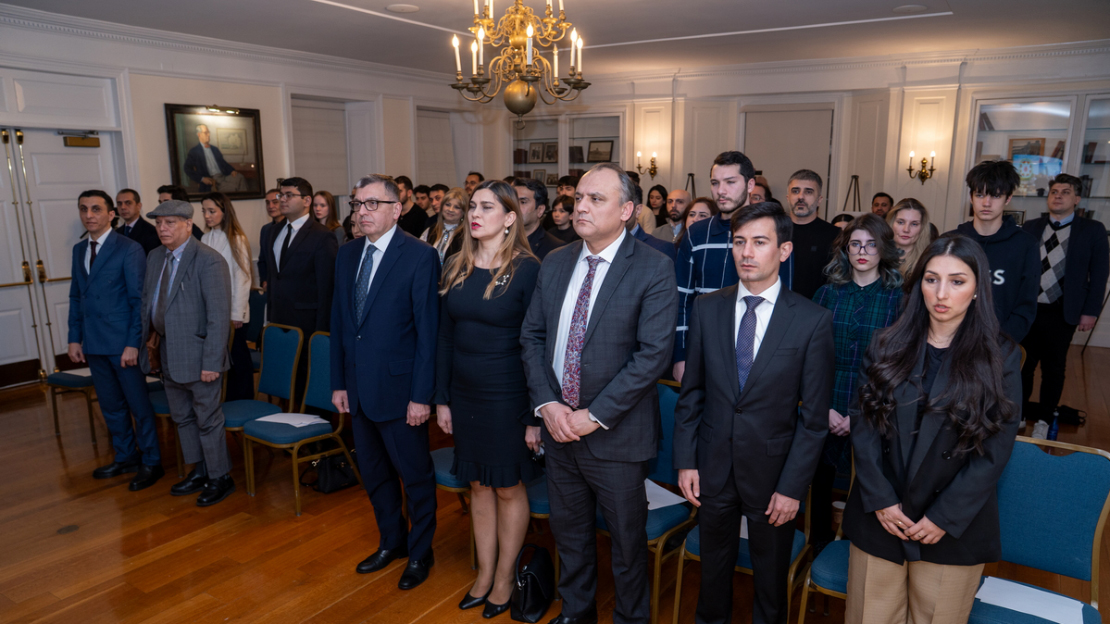Remarks by Ambassador Mr. Tofig F. Musayev, Permanent Representative of the Republic of Azerbaijan to the United Nations at the “Khojaly tragedy” event organized by the Azerbaijani American Youth Association
New York, International House Columbia University, Home room
23 February 2025
This year marks the thirty-third anniversary of the largest massacre committed during the aggression of Armenia against Azerbaijan. The attack and capture of the town of Khojaly in February 1992 involved the killing of hundreds of Azerbaijanis, including women, children and the elderly, and thousands of civilians were wounded and taken hostage, many of whom remain missing, while the town was razed to the ground. One expert commentator has described the slaughter in Khojaly as “by a large margin the worst single atrocity of the Armenian-Azerbaijani war”.[1]
It is noteworthy that this happened less than a month after the United Nations Security Council recalled, in the context of Armenia’s admission to the United Nations, “Armenia’s solemn commitment to uphold the Purposes and Principles of the Charter, which include the principles relating to the peaceful settlement of disputes and the non-use of force”.[2]
The tragedy in Khojaly elicited an international outcry. The international documents adopted in connection with the conflict, in addition to condemning the use of force against Azerbaijan and the occupation of its territories, also explicitly referred to serious violations of international humanitarian law committed during the conflict.
Thus, for example, in its resolutions and presidential statements adopted between 1992 and 1995, the United Nations Security Council expressed grave concern about “the displacement of a large number of civilians in Azerbaijan and the serious humanitarian emergency in the region” and condemned the “attacks on civilians and bombardment of inhabited areas.”
The European Court of Human Rights, in its judgment of 22 April 2010, qualified mass killings in the Khojaly town as "acts of particular gravity which may amount to war crimes or crimes against humanity".[3]
Furthermore, a number of national parliaments, eminent international lawyers, foreign journalists, human rights activists and international NGOs condemned the slaughter in Khojaly as an act of genocide or a crime against humanity.
The overall assessment of the causes and consequences of the war and the existing evidence make it absolutely clear that the crimes committed in Khojaly were not isolated or sporadic acts, but were part of widespread and systematic policy and practice of atrocities motivated by ethnic and religious hatred and intolerance.
At the same time, the prohibited methods and means of warfare throughout the conflict, such as the unlawful targeting of Azerbaijani civilians and peaceful settlements, the taking and holding of hostages, the mistreatment and summary execution of prisoners of war and civilian detainees, ethnic cleansing, the extensive destruction of inhabited areas and civilian infrastructure and the desecration and eradication of Azerbaijani cultural and religious heritage, were deliberately used by the aggressor to achieve and cement its military gains.
The counteroffensive operation and the local counter-terrorism measures carried out by Azerbaijan in the fourth quarter of 2020 and in September 2023, respectively, put an end to the unlawful occupation of its territories and ensured the restoration of its sovereignty and territorial integrity.
The liberated territories revealed the scale of human suffering and destruction. Since the end of the conflict in November 2020, 18 mass graves containing the remains of over 600 people have been discovered in those territories, including Khojaly. These mass graves shed light on the willful killing of many civilians and other persons protected under international humanitarian law.
As to the legal consequences, the crimes committed in Khojaly and other grave violations, to which I referred above, entail the State responsibility under international law and individual liability under international criminal law and the national penal legislations. In regard to the latter aspect, the obligation of States to punish the most serious crimes is prescribed in the relevant international instruments, as well as has been repeatedly reaffirmed by the General Assembly and the Security Council.
Azerbaijan has taken decisive steps to investigate and prosecute the grave violations of international humanitarian law and international human rights law, in full accordance with its national legislation and international obligations.
However, most of the perpetrators, having found a safe haven in Armenia and other countries, continue to enjoy impunity. The denial and ignorance of their crimes, along with the attempts to obstruct justice by various political means and smear campaigns in mass media, parliaments and international bodies, constitute a clear contempt for international law and the rule of law, serve to consolidating impunity and pose a threat to sustainable peace in the region.
Azerbaijan will never forget the atrocities committed against its people and will continue its efforts to ensure justice and accountability for flagrant violations of international law, as well as to build, strengthen and sustain peace and stability in the region.
[1] Laurence Broers, Armenia and Azerbaijan: Anatomy of a Rivalry (Edinburgh, Edinburgh University Press, 2019), p. 37.
[2] See Note by the President of the Security Council S/23496 of 29 January 1992.
[3] Judgment of the European Court of Human Rights of 22 April 2010, para. 87.

